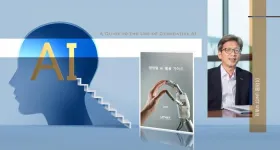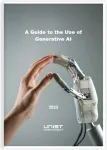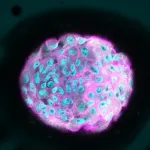(Press-News.org) Under the leadership of UNIST Education Innovation Task Force, a comprehensive guidebook titled ‘A Guide to the Use of Generatvie AI‘ was released on July 28, 2023. This guidebook presents alternative approaches to utilize generative AI, like ChatGPT more efficiently rather than simply prohibiting their use. With a focus on teachers, researchers, and students, the 50-page guidebook provides practical examples of generative AI utilization.
To gain insights into the purpose and development process behind this guidebook, the UNIST Public Relations Team met with Vice President Jaiyong Lee of Research and Academic Affairs at UNIST. The interview shed light on how this initiative differs from approaches taken by other universities.
[Q&A with Vice President Jaiyong Lee of UNIST]
Q: What is the purpose behind creating this guide?
The purpose of creating this guide was to address the concerns and issues raised after OpenAI’s ChatGPT was made available to the public. Its release sparked surprise and concern, particularly in education and academia, with a major focus on potential problems like cheating or plagiarism within educational settings. In response to these concerns, numerous domestic and international academic organizations quickly announced guidelines regarding artificial intelligence , while some even implemented complete bans on the use of generative AI.
It is common for new technologies to give rise to various concerns when integrated into everyday life. Similar situations have occurred in history, such as when cars were first introduced in the UK. At that time, people felt threatened by noisy steam-powered vehicles, raising worries about the potential decline of the horse-drawn carriage industry and loss of employment opportunities for coachmen. As a result, Britain enacted the ‘Red Flag Act‘ in 1865, which imposed regulations requiring drivers to have passengers onboard while riders holding red flags during daylight hours or red lanterns after dark had to walk ahead of cars warning pedestrians and horse riders about approaching vehicles. Additionally, maximum speed limits were set for automobiles.
However, despite having an early start in automobile industry development due to such regulations like the ‘Red Flag Act,’ England eventually lagged behind Germany and United States because these laws hindered rather than promoted automobile innovation. Today, with advancements in generative AI technology, many people express similar fears regarding their impact as seen during those initial years with cars’ introduction. However instead of creating regulations prohibiting usage outrightly we wanted produce practical guidance highlighting effective and correct methods on how to use Generative AI effectively.
We understand that many may have expected more specific policies right away; however it was important for us to take time and carefully evaluate generative AI’s capabilities along with its potential impact on education before producing this guidance book. Therefore several months were spent in preparation to ensure the creation of a comprehensive and thoughtful resource.
Under the leadership of the UNIST Education Innovation Task Force, a comprehensive guidebook titled ‘A Guide to the Use of Generative AI’ was released on July 28, 2023.
Q: Could you please provide insights into the development process of this guide?
A: UNIST Education Innovation Task Force took the lead in developing the guidebook. Our initial priority was to listen to real users and experts within UNIST. We organized meetings involving heads of relevant departments, university deans, professors from graduate schools specializing in artificial intelligence, as well as humanities professors while also engaging various administrative departments. It was crucial for us to understand usage patterns and perceptions among actual UNIST members who are end-users, so we conducted surveys accordingly. Additionally, during our TF meetings, we examined case studies at both domestic and foreign universities while analyzing trends across academia, industry, and educational institutions regarding generative AI. Thus one can say that the final version of this guidebook is a culmination of these comprehensive discussions which involved survey data analysis gathered from faculty researchers and students present at UNIST meetings.
Q: What content does the guidebook include?
A: This guide provides a brief introduction about generative AI technologies followed by guidelines tailored specifically for teachers, researchers, and students on tips for effective utilization. Additionally, the appendix includes survey results on the use of generative AI and awareness among UNIST’s teachers, students, and researchers.
Q: Many universities have released guidelines related to generative AI. What sets UNIST’s guide apart?
A: The main distinction lies in our practical approach tailored to different user groups. At UNIST, we have developed specific guidelines and usage recommendations from the perspectives of professors, students, and researchers. In reviewing existing guidelines from other institutions both domestically and internationally after the emergence of ChatGPT, we found that most were abstract and did not serve as practical guides for users.
UNIST took a different approach by aiming to provide concrete solutions that address real-world challenges encountered in educational and research settings. Our guide is designed to be a valuable reference for universities worldwide, offering actionable insights rather than vague theoretical concepts. By focusing on practicality and relevance, UNIST’s guide stands out as a comprehensive resource that offers tangible guidance for navigating the complexities of generative AI in an academic context.
Q: Before initiating the development of this guide, the UNIST Education Innovation Task Force conducted a comprehensive survey specifically targeting generative AI usage and awareness among UNIST members. Could you please share some insights into their usage status and perceptions?
A: In preparation for this guidebook, we recognized the importance of understanding how our university community currently utilizes generative AI technology and their perceptions towards it. To gather these insights, we conducted a survey involving 70 teachers/professors, 147 graduate students/scholars/researchers (Ph.D., Master’s), undergraduate students (Bachelor’s), and 36 researchers. It is noteworthy that around 90% of respondents were already aware of generative AI technology either through personal usage or academic exposure.
One interesting finding from the survey is that most student respondents who had used generative AI demonstrated an awareness of its limitations. They actively fact-checked generated outputs for accuracy instead of relying on them uncritically. Initially concerned about potential over-reliance on such technologies by students alone, this discovery revealed a positive aspect—an inclination towards critical examination. These survey results guided us in developing a guidebook that emphasizes effective utilization rather than imposing an outright ban on generative AI technology.
Q: Lastly, is there any message you would like to convey to the members of UNIST?
A: In the rapidly evolving landscape of artificial intelligence technology, we are faced with the question of whether our future will be shaped by a highly developed utopia or a dystopia. However, let us remember the wise words, “The best way to predict the future is to create it.” I firmly believe in this philosophy. As UNIST members, I encourage you all to use your expertise and knowledge to shape a utopian future hand-in-hand with artificial intelligence. Together, let’s harness its potential for positive impact and pave the way towards a better tomorrow.
The ‘Generative AI Utilization Guide’ announced by UNIST can be found through the links below:
English: https://heyzine.com/flip-book/3a9d4cb37e.html
Korean: https://heyzine.com/flip-book/a9b98c0d61.html END
UNIST releases generative AI utilization guide to promote smart usage of ChatGPT
2023-09-14
ELSE PRESS RELEASES FROM THIS DATE:
Preventing the tissue's response to stiffness may be key to slowing the progression of breast tumors
2023-09-14
Cells are capable of translating mechanical changes into biological responses. This process is known as mechanotransduction and plays a fundamental role in the progression of solid tumors, such as breast cancer.
It is well-established that a common mechanical alteration in cancer progression involves tissue hardening. This stiffness is precisely what is detected during self-examinations or breast palpations for potential tumor detection. The stiffness of breast tissue triggers a chain reaction, inducing tension within cells and distorting their nuclei. Ultimately, this nuclear deformation activates genes responsible for controlling cell proliferation, which are closely associated ...
Members of the National Association of Neonatal Nurses support efforts to promote racial equity
2023-09-14
September 14, 2023 — More than 90% of the active members of the National Association of Neonatal Nurses (NANN) believe the organization should pursue racial equity work, and many have specific suggestions for a strategic plan. This feedback comes from the survey results the association released this month in its journal, Advances in Neonatal Care. The journal is published in the Lippincott portfolio by Wolters Kluwer.
"Neonatal care has advanced significantly in recent years, yet ...
Webb Confirms accuracy of universe’s expansion rate measured by Hubble, deepens mystery of Hubble constant tension
2023-09-14
The rate at which the universe is expanding, known as the Hubble constant, is one of the fundamental parameters for understanding the evolution and ultimate fate of the cosmos. However, a persistent difference called the “Hubble Tension” is seen between the value of the constant measured with a wide range of independent distance indicators and its value predicted from the big bang afterglow.
NASA’s James Webb Space Telescope provides new capabilities to scrutinize and refine some of the strongest observational evidence for this tension. Nobel Laureate Adam Riess from the Johns Hopkins University and ...
Penn Medicine’s Carl June, MD, to receive 2024 Breakthrough Prize in Life Sciences
2023-09-14
PHILADELPHIA – CAR T cell therapy pioneer Carl June, MD, the Richard W. Vague Professor in Immunotherapy in the Perelman School of Medicine at the University of Pennsylvania and director of the Center for Cellular Immunotherapies (CCI) at Penn Medicine’s Abramson Cancer Center, has been named a winner of the 2024 Breakthrough Prize in Life Sciences for the development of chimeric antigen receptor (CAR) T cell immunotherapy, a revolutionary cancer treatment approach in which each patient’s T cells are modified to target and kill their cancer cells. The invention sparked a new path in cancer care, harnessing the power of patients’ own immune systems, a once-elusive ...
New research published by Nature Food reveals food is primary driver of the EU-27’s outsized Ecological Footprint
2023-09-14
One quarter of food consumed in the EU-27 originates from outside the region, highlighting the vulnerability of the EU’s food system.
New research coordinated by Global Footprint Network’s sustainability scientists in collaboration with food system experts published the article “EU-27 Ecological Footprint was primarily driven by food consumption and exceeded regional biocapacity from 2004 to 2014” today in Nature Food. The way food is provided to and consumed by Europeans represents ...
Rivers are rapidly warming, losing oxygen; aquatic life at risk, study finds
2023-09-14
UNIVERSITY PARK, Pa. — Rivers are warming and losing oxygen faster than oceans, according to a Penn State-led study published today (Sept. 14) in the journal Nature Climate Change. The study shows that of nearly 800 rivers, warming occurred in 87% and oxygen loss occurred in 70%.
The study also projects that within the next 70 years, river systems, especially in the American South, are likely to experience periods with such low levels of oxygen that the rivers could “induce acute death” for certain species of fish and threaten aquatic diversity at large.
“This is a wake-up call,” ...
London has the fastest increase in cooling demand in the world, shows new model
2023-09-14
A model to map energy demand down to street level shows cooling demand in the capital grew by 5% per year between 1980 and 2022 as summers heat up.
The Demand.ninja model, created by researchers at Imperial College London and TU Delft, was designed to show how the weather influences hourly energy consumption in buildings. It can also account for changes in demand as the climate changes, including the increase in cooling demand in the summer as heatwaves become more common and more intense.
Countries ...
New research signals a quantum leap for brain tumour treatment
2023-09-14
Researchers have discovered a new way to target and kill cancer cells in hard-to-treat brain tumours using electrically charged molecules to trigger self-destruction, that could be developed into a spray treatment used during surgery.
A multidisciplinary team of researchers from the University of Nottingham, led by the School of Pharmacy found a new way to harness the extraordinary capabilities of bio-nanoantennae—gold nanoparticles intricately coated with specialised redox active molecules to induce programmed cell death, or apoptosis, in cancer cells on electrical stimulation. The research ...
Use of physical therapy and subsequent falls among patients with dizziness
2023-09-14
About The Study: The findings of this study of 805,000 patients ages 18 or older suggest that receipt of physical therapy (PT) after presentation for dizziness was associated with a reduction in fall risk during the subsequent 12 months; thus, timely PT referral for dizziness may be beneficial for these patients. Future research, ideally with a clinical trial design, is needed to explore the independent impact of PT on subsequent falls for adults with dizziness.
Authors: Meredith E. Adams, M.D., M.S., of ...
Geographical variation in social determinants of female breast cancer mortality across US counties
2023-09-14
About The Study: The results of this study of 2,176 counties suggest that breast cancer mortality in the U.S. can be affected by where individuals live, and that more comprehensive and geographically targeted interventions may lead to healthier communities.
Authors: Taylor Anderson, Ph.D., of George Mason University in Fairfax, Virginia, is the corresponding author.
To access the embargoed study: Visit our For The Media website at this link https://media.jamanetwork.com/
(doi:10.1001/jamanetworkopen.2023.33618)
Editor’s Note: Please see the article for additional information, including other authors, author contributions ...




